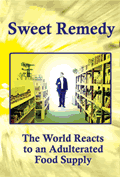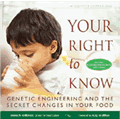INDUSTRY INSENSITIVITY TO HEALTH DRIVES CODEX AGENDA
by
Attorney Scott Tips, JD
May 8, 2013
NewsWithViews.com
The
hazy, smoggy skies over Beijing during these March days are emblematic
of the Codex meetings that the National Health Federation (NHF) has
been  attending
for many days here in China. The Sun only shimmers as a strange, pale
orange globe, casting an ethereal, almost futuristic “Bladerunner”
look to the cityscape while city residents glide silently past with
white face masks and we Codex delegates and staff work inside overheated
rooms on international food-additive standards. Given what has transpired,
the setting seems apt.
attending
for many days here in China. The Sun only shimmers as a strange, pale
orange globe, casting an ethereal, almost futuristic “Bladerunner”
look to the cityscape while city residents glide silently past with
white face masks and we Codex delegates and staff work inside overheated
rooms on international food-additive standards. Given what has transpired,
the setting seems apt.
Throughout the week of March 18-22, 2013, the Codex Committee on Food Additives (CCFA) met at the Asia Hotel in Beijing, China, chaired by Dr. Junshi Chen of the China National Center for Food Safety Risk Assessment, to consider hundreds of food additives, some of which are innocuous, even healthful, others of which are most decidedly toxic. The problem is that many of the Codex delegates cannot discern the difference between the two, the haziness of their thinking working in some sort of bizarre parallel to the opaque weather outdoors.
As the only consumer group present at this meeting, and the working group that preceded it, the NHF offered a unique perspective on what its members consider healthful and what it does not. To us, aluminum-containing food additives and aspartame are self-evidently toxic and should be removed from the food supply. However, to the trade organizations here, and their foot servants in too many of the regulatory agencies that sit in as the country-member Codex delegates here, such food additives are simply vehicles of manufacturing convenience and health be damned. In fact, I rather suspect that had these same businesses been manufacturing leaden drinking vessels during the heyday of the Roman Empire, then they would have similarly defended such vessels’ use as vital and indispensable tools of commerce, no matter that the users were slowly being poisoned by the deadly, leaching lead.
Ubiquitous, Dangerous Aluminum
Scientists have known that aluminum is toxic since at least 1911. Even the first commissioner of the U.S. Food and Drug Administration (FDA), Dr. Harvey Wiley, admitted, in his 1929 book History of Crime against the Food Laws, that “From the earliest days of food regulation, the use of alum [aluminum sulphate] in foods has been condemned. It is universally acknowledged as a poison in all countries. If the Bureau of Chemistry had been permitted to enforce the law … no food product in the country would have any trace of … any aluminum or saccharin.” Dr. Wiley was the major force behind the first pure food law in the United States, but he resigned in disgust because the laws were not being enforced. To this date, aluminum has never been tested for safety by the FDA.
Aluminum is a known neurotoxin, easily crossing the blood-brain barrier, and it interferes with ATP enzymes, which carry out the important function of energy transfer among brain cells. Aluminum worsens the effects of other toxins, such as pesticides, herbicides, mercury, cadmium, fluoride, lead, and glutamate. It also detaches highly oxidizing iron in the bloodstream from its protective carrier transferrin. This greatly increases the toxicity of iron and is at least one of the mechanisms by which aluminum is toxic to the brain. Warnings about the toxic effects of aluminum could, and do, fill volumes.
Aluminum ammonium sulfate, aluminum silicate, calcium aluminum silicate, sodium aluminum phosphates, and sodium aluminosilicate are the food additives that Codex was reviewing this session. They can be found in practically as many foods as you can imagine: vegetables, soybean paste, crackers, pastas and noodles, bagels, English muffins, pita bread, bread and baking mixes, chewing gum, milk and cream powder, processed cheeses, flours, batters for fish and poultry, dairy-based drinks such as eggnog, beverage whiteners, dried-whey products, salt, seasonings and condiments, soup and broth mixes, and sauces. And do not think that you can always look at labels and see them disclosed there because often the aluminum compound is hidden within a particular product identity.
The Working Group
One of the things you learn early on at Codex meetings is the importance of the various ad-hoc working groups that the Codex Committees form from time to time to deal with specific food topics. These working groups either take the form of “electronic” Working Groups (eWGs) or “physical” Working Groups (pWGs). In the same way that the Codex Committees perform the grunt work for the parent Codex Alimentarius Commission, the working groups perform the dirty work for the Committees. If a delegate wants to have an impact at Codex, it is important to start at the bottom of the food chain and work one’s way upward.
At the Physical Working Group (as opposed to the Electronic Working Group) on the Codex General Standard for Food Additives (GSFA) that met on Friday, March 15-16th, and which was ably chaired by Mr. Paul Honigfort (a Consumer Safety Officer with the FDA), the NHF and the European Union repeatedly and harshly criticized aluminum-containing food additives and called for their removal. At various times the delegations of Iran, Japan, Brazil, and even China helped us by joining us in that call. But, we were opposed by the usual Codex suspects, the ones whom you would really think knew better – the delegations of Australia, the United States and Canada – and their handlers, those front organizations that masquerade as trade organizations, such as the International Food Additives Council (IFAC). Playing tag-team with IFAC on this issue was the International Council of Grocery Manufacturers Associations (ICGMA), another industry apologist for keeping aluminum in food additives.
In dishing out scorching criticism of aluminum and its proponents, NHF came under return fire from Australia, IFAC, and the Working Group Chairman! The arrogance of Australia was particularly notable since Australia seems to always be on the wrong side of the health issues at all Codex meetings. What's up with that? Is it ignorance or is Australia simply the point man for the United States on all of these issues? To my memory, Australia has never met an unhealthy Codex standard that it did not love. And "in your face" discussions by Katherine Carroll (a member of the NHF delegation) with Australia only confirmed Australia's intransigence and lack of interest in health.
As the delegations tangled and argued over the aluminum food additives, the essence of the debate was not over the danger of the additives but over the need of the industry for aluminum in producing its foods and drinks. Supported by Australia, IFAC, along with its sidekick ICGMA, cried out constantly that the "Industry" just could not make its products without aluminum food additives. Their members’ spraying equipment "might overheat and catch fire," IFAC lamented. When NHF suggested that this was a not a genuine issue and that the industry has enough clever engineers to easily innovate its way out of this "problem" and create non-overheating equipment, NHF was sharply rebuked by the Chairman for suggesting that IFAC might not be telling the truth. Yet, really, in a World full of engineers, how long would it take to fashion a solution to the spraying-equipment fires, if any, that IFAC successfully interjected as a reason to keep some aluminum food additives? Monkeys in a zoo could solve this problem. Or, maybe not – if they had consumed too much aluminum.
At one point, the ICGMA representative stated that the aluminum food additive was the “best” for the job. Speaking immediately next, I started out with the retort that “’Best’ obviously did not include any consideration of health. It only included consideration of what was best to manufacture the product.” It would seem that for these food-additive companies, whatever is best for them must be best for the rest of us. Which is sort of like saying that if you kick someone enough times for you to feel good, then it must be good for the victim too.
Still, by the end of the first day and after I had spoken out some two dozen times, the success of the EU and NHF could be tallied by the numerous uses of aluminum food additives that the Working Group would suggest be discontinued to the full Committee meeting. Although there were also many food-additive uses that still remained – no thanks to the interventions of voluble Australia, the U.S., Canada, IFAC, and ICGMA – they were at greatly reduced levels, usually cut in half or more. So, progress was made; and most delegates agreed that Codex’s goal was the eventual elimination of all aluminum food additives.
On the issue of aspartame as a food additive, which was the subject of a Conference Room Document (CRD 12) drafted by the Federation, neither the working group nor the full Committee had the time to debate this additive and the can was kicked down the road, to be considered at next year’s meeting.
With minor adjustments of no real import, the overall recommendations of the working group were accepted by the full Committee and referred up to the Codex Commission.
The Opposition
It seemed self-evident that the main country delegations pushing aluminum additives had received their marching orders from industry. The real key, then, was industry itself, represented as it was at Codex by trade groups that, in some cases, might be more properly called front groups for big players like Monsanto and DuPont. They seemed to be calling the shots, but who is really behind them?
Dr. Joseph Mercola, in particular, recently and very helpfully wrote, “[I]’m making public IFAC’s list of officers and board members as of 2011. It wasn’t easy to find this list, primarily because IFAC isn’t a regular 501(c)(3). In fact, it isn’t a 501(c)(3) at all. Actually, it’s a 501(c)(6) – an IRS classification for nonprofit “commercially oriented” organizations such as football leagues, chambers of commerce and, apparently, groups like IFAC. Once you know its non-profit classification, you can find its 990 forms – which all non-profits must file, complete with lists of officers and directors. I obtained IFAC’s 990s for the years 2004-2011. And there I learned the truth. Except for two, who I couldn’t find any information at all on, all of IFAC’s officers and directors are linked to processed foods and additives in some way, with at least six of them having direct or business links to Monsanto and/or DuPont. That’s right. Six of IFAC’s governing board members are linked to the largest GMO producers in the world.”
And
in looking at the large IFAC delegation, one can see names linked with
Solae LLC (which used to be known as DuPont Protein Technologies), Innophos
Inc. (leading producer of phosphates), Ashland China (BigAg), and the
Kellen 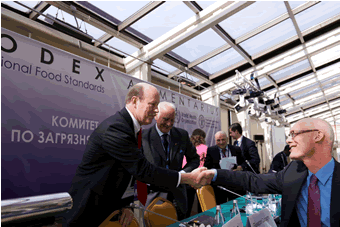 company
(which manages so many of these front groups). The paw prints of these
anti-health companies are all over the industry trade group INGOs at
Codex, just as they are over certain Codex delegations. The NHF was
the only consumer group present at the CCFA meeting – the David
against these Goliaths.
company
(which manages so many of these front groups). The paw prints of these
anti-health companies are all over the industry trade group INGOs at
Codex, just as they are over certain Codex delegations. The NHF was
the only consumer group present at the CCFA meeting – the David
against these Goliaths.
Speech in Moscow
Still, the National Health Federation has gained enough respect over its many years at Codex, and after so many vocal battles with Chairmen, Chairwomen, and other delegations in arguing for health and health freedom, that while at the CCFA meeting in Beijing, I was asked by the Chairman of the Codex Committee on Contaminants in Food (CCCF) to give a speech for NHF on behalf of all consumers worldwide on the occasion of the 50th anniversary of the founding of Codex. The speech was to be given in Moscow, Russia on April 10th during a special session of the meeting. I accepted.
That acceptance, though, meant flying back through California, New Jersey, and France, and then on to Moscow in time for the meeting and speech. Stubborn snow, carefully scooped up off the streets and sidewalks into neat piles, slowly melting in the Sun, greeted me as I arrived there. I prepared my speech during the trip and while there in Moscow, and on that clear Wednesday day, presented it.
There were seven speakers in all, four country delegations, the NHF for consumers, and then two industry speakers, in that order. Sitting at the head table before more than 200 delegates, I was right next to the podium, and speakers as they each spoke in turn. I could see them up close and they all spoke well, using PowerPoint, and about their country/industry’s involvement in Codex.
| Subscribe to the NewsWithViews Daily News Alerts! |
When it was my turn to speak, I spoke instead, without PowerPoint, about my experiences in arguing against melamine at my first CCCF meeting; about the essence of Codex being to protect the consumer by ensuring access to a healthy diet; about consumers being suspicious of Codex and its cozy relationship with industry; about the ease with which regulators can get caught up in “standard making” and forget the human faces and costs behind these rules and standards; about ”science based” evidence being nothing more than a word that can be twisted and used in the wrong way as it was once used against Galileo; about “old errors being more popular than new truths”; about us all being consumers with families and lives, and that it is important for us to always remember that there are real people, real human faces, affected by the decisions made at Codex; and about the delegates’ duty to them.
It was not the firebrand, head-clubbing speech that some there had feared I would make (or that others not there had hoped I would make), but it was spoken to win hearts and not smash them. Seemingly, the message was received. Perhaps in time it will even be acted upon.
� 2013 - Scott Tips - All Rights Reserved

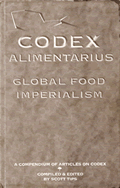



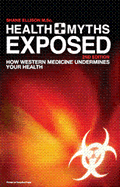




 Share
This Article
Share
This Article




